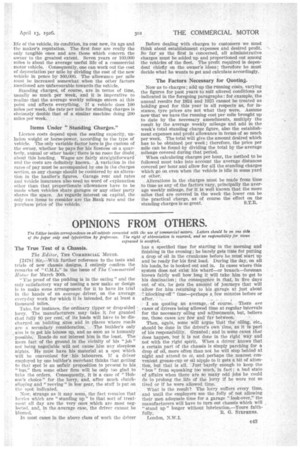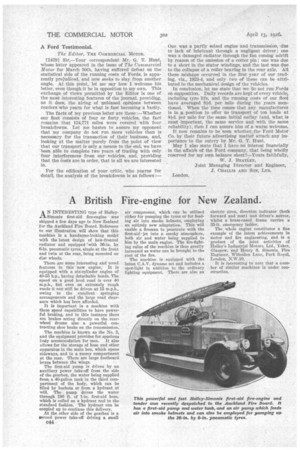OPINIONS FROM OTHERS.
Page 27

Page 28

If you've noticed an error in this article please click here to report it so we can fix it.
The Editor invites correspondenee on all subjects connected with the use of commercial motors. Letters shOUld be on one side of the paper only and tyPetbritten by preference. The right of abbreviation is reserved, and no responsibility for views
expressed is accepted.
The True Test of a Chassis.
The Editor, TEE COMMERCIAL MOTOR.
[24781 Sir,—With further reference to the tests and trials of new chassis designs, I entirely confirm the remarks of " C.M.L." in the issue of The Commercial Motor for March 30th.
"The proof of the pudding is in the eating" and the only satisfactory way of testing a new make or design is to make some arrangement for it to have its trial In the hands of an average driver, on the average. everyday work for which it is intended, for at least a
thousand miles, • Take, for instance, the ordinary tipper or drop-sided lorry. The Manufacturers may take it for granted that full Y 80 per cent: of its loads will have to bed ischarged on building sites and in places where roads
are a secondary consideration. The builder's only aim is to get. his houses up, and as soon as is humanly possible. Roads do not interest him in the least. The mere. fact of the ground in the vicinity of his " job " not being negotiable will not cause him any sleepless nights. • He twist have his material at a spot which will be convenient for his labourers. If a driver employed by one builder's merchant thinks that getting to that spot is an unfair proposition to present to his "bus," then some other firm will be only too glad to take the orders. Consequently, it is a case of " HObson's choice" for the lorry, and, after much clutchslipping and " revving " in low gear, the stuff is put on the spot indicated.
New, strange as it may seem, the fact remains that lorries which are "standing up " to that sort of treatment all day are the very ones which are most neglected, and, in the •average case, the driver cannot be blamed.
In most cases in the above class of work the driver has a specified time for starting in the morning and finishing in the evening; he barely gets time for putting a drop of oil in the crankcase before he must start up and be ready for his first load. During the day, on all his loads, he is booked out and in. In cases where this system doe not exist his wharf—or branch—foreman knows fairly well how long it will take him to get to his destination; the consequence is that in five days out of six, he gets the amonnt of journeys that will allow for him returning to his •garage at just about " knocking-off " time—perhaps a few minutes before or after.
I am quoting an average, of course. There are cases of drivers being allowed time at regular intervals for the necessary oiling and adjustments, but, believe me, those cases are few and far between.
Then, again, some will argue that the oiling, etc., should be done in the driver's own time, as it is part of his responSibility. Granted ; and in some cases that does happen, but it is not done in the right way and not with the right spirit. When a driver knows that a certain part of the chassis is simply parching for a drop of oil, more often than not he will stop behind at night and attend to it, and perhaps the nearest convenient grease-cup or oil nipple to it gets a bit of attention, but that is all. Just barely enough to keep the " bus " from squeaking too much, in fact ; a bad state of affairs when there are so many odd jobs he could do to prolong the life of the lorry if he were not so tired or if he were allowed time.
What is the result? The lorry suffers every time, and until the employers see the folly of not allowing their men adequate time for a garage "look-over," the manufacturers will have to turn out chassis which will , "stand up" longer without lubrication.—Yours faith
A Ford Testimonial.
The Editor, THE COMMERCIAL MOTOR.
[24791 Sir,—Your correspondent Mr. G. T. Hunt, whose letter appeared in the issue of The Commereiat Motor for March 30th, having suffered defeat on the statistical side of the running costs of Fords, is apparently prejudiced,and now seeks to slay from another angle. At this point, let me say how I welcome his letter, even though it be in opposition to my own. This exchange of views permitted by the Editor is one of the -most interesting features of the journal, providing, as it does, the airing of unbiased opinions between readers who yearn for what is fast becoming a arl.t.y.
The facts of my previous letter are these :—Whether our fleet consists of four or forty. vehicles, the fact remains that 124,771 miles were covered with four breakdowns. Let me hasten to assure my opponent that my company do not run more vehicles than is necessary for the transaction of their business, and, looking at the matter purely from the point of view that our transport is only a means to the end, we have been able to complete two years of trading with only
• four .interferences from our vehicles, and, providing• that -the Costs are in order, that is all we are interested in.
For the edification of your critic, who yearns for detail, the analysis of the breakdowns is as follows : London. One was a partly seized engine and transmission, due to lack of lubricant through a negligent driver; one was a damaged radiator through the fan coming adrift by reason of the omission of a cotter pin ; one was due to a short in the stator. windings, and the last was due to the collapse of a roller bearing in the rear axle. All these mishaps occurred in the first year of our trading, viz., 1923-4, and only two of these can be attributed to the meChanical design of the vehicles.
In conclusion, let me state that we do not run Fords on supposition. Daily records are kept of every vehicle, including tyre life, and the running costs of our fleet have averaged Sid. per mile during the years mentioned. When the time comes that any manufacturer is in a position to ()fifer us transport of ton loads at Sid. per mile for the same initial outlay (and, what is most important, the same service and. with the same reliability), then I can assure him of a warm welcome.
It now remains to he seen whether the Ford Motor Co. by their future advertising matter attach any importance to the outcry by Mr. G. T. Hunt.
May I also state that I have no interest financially in the affairs of the Ford company, that being wholly reserved for my own balance sheet'?--Yours faithfully, W. J. BEATLEY,
Joint Managing Director and Engineer, J. CHALLIS AND SON, LTD.






























